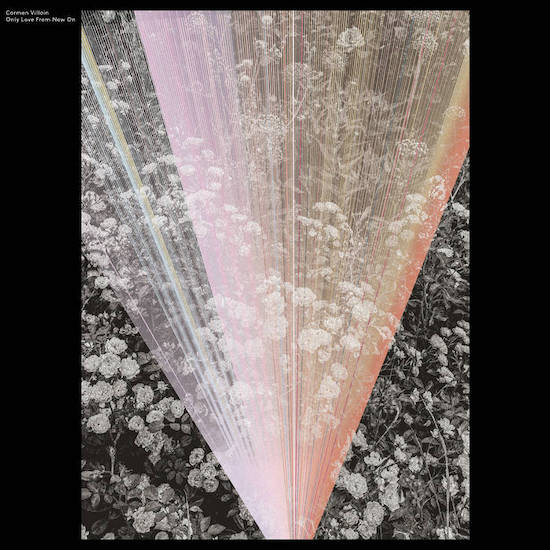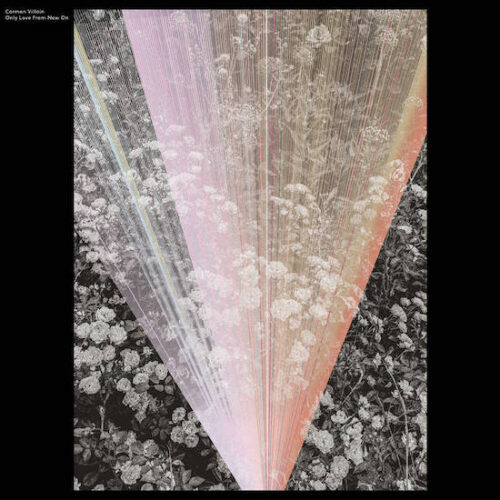Carmen Villain is a world builder, and these days, I’m glad for it. (Have you seen the world we’re living in?) Like a lot of people, I’m still trying to come to grips with 2020 and 2021, the latter – again, this is probably true of a lot of people – being almost certainly the most traumatic year of my life, personally speaking. I’ll not get into it here, though none of it’s a big secret. In any case, in most ways a year can be traumatic, last year was. Not just on a personal level, but communally, at every strata of society: local, citywide, statewide, nationally, globally. Then, as soon as we maybe have a handle on what just happened to us, a looming tidal wave of shit has us all on our heels. Anyway, sometimes you’ve got to dip out for a half hour, forty-five minutes. So yeah, thank goodness for world builders.
Villain conjures landscapes both natural and manmade in sound, realising sonic vistas coloured in rich violets. There are yellows and oranges and vibrant greens, and warm red tempered by cool blues. There’s speckled sunlight on water, humidity hanging in the air, condensation on foliage. Things are lush mostly, and sometimes dewy, but there are quiet, empty streets, too. You can absolutely see it. And you can feel it – a certain sense of safety in nature, of safety among friends, among family. There’s a kind of specificity, too. We’re not talking vague platitudes or generalizations. Villain’s worlds are inner visions projected outwards.
That’s a description of Villain’s latest LP, Only Love From Now On, by the way. It’s the fifth in a string of near-perfect, roughly album-length releases that kicked off with the release of Both Lines Will Be Blue in mid-2019. I’ve written about Villain’s aesthetic at length before: “gentle but never wimpy”; “the crossroads of dub, ambient, and new age”; “canyon-esque dub space”. And all of that still applies. What we’re witnessing here isn’t radical reinvention (which is hugely overrated anyhow), but the continued refinement and mastery of a specific milieu, and the judicious introduction of new elements and a new collaborator in Arve Henriksen – who joins Villain on trumpet and electronics along with longtime collaborator Johanna Scheie Orellana on flute.
Only Love’s three collaborations – which bookend the record and mark its midpoint – are highlights. Henriksen appears on the lengthy opener ‘Gestures’, a track that emphasises and foregrounds the Hassellian fourth-worldisms that Villain makes her own throughout the LP as brass and woodwind float and whorl over a beat that knocks and sways. The track has a languid feel but is never aimless, serving as an ideal introduction to the album’s overall vibe, which is further underscored by the beatless title track featuring Orellana. Over the course of eight minutes, layers of flute and breathy, hissing drone commingle in airy sort of choreography. The composition maintains an almost meditative sensibility until about five minutes in, when Orellana’s flute briefly breaks free and soars in a moment of ecstatic enlightenment. If ‘Gestures’ underlines the Hassell in Villain’s sound, ‘Only Love From Now On’ highlights her affinity for the cosmic jazz of Alice Coltrane et al.
Closer ‘Portals’, once again featuring Orellana, brings the album full circle. The interplay between the thrumming beat and wind instruments recalls the album’s opener, as if adding Orellana’s voice to the previous conversation. Crucial to the track’s success, and to the success of the album as a whole, is Villain’s careful consideration of low-end and rhythm in her compositions. Her work possesses a rich variety of bass tones and rumbles with subs. Even at points where there’s no beat to speak of, as on ‘Silueta’, rhythmic momentum is never neglected. Things don’t simply drift. Loops cycle like wheels within wheels atop wheels, moving the track forward to its conclusion.
While there is a comforting aspect of escapism to listening to Villain’s work, she’s no fantasist. Instead, I’d say there’s something of the utopian about these compositions, of what could be. There’s a strange feeling of history, of something won. By that same token, hers isn’t a world free of tension. You can sense the precarity of it all, perhaps in recognition of the importance of balance – between mankind and nature, and in all things. Or it could be I’m reading too much into it, projecting.
Of all the stuff that made the past year or two so difficult to process, maybe the weirdest was the realisation that it wasn’t all bad. There were some high highs amid the lows. When viewed from a slightly different angle, Villain’s optimistic music can seem like an acknowledgement of this, expressly composed to help us see that even in a world awash with ugliness and hate, beauty and love are possible. And if those anomalies can exist, so too must justice sometimes come to pass in an unjust world, and so too must the humane exist in an inhumane world. And so on and so forth. At the risk of mawkishness, Villain’s most vivid conjuring within Only Love From Now On might simply be hope. And if that, against all odds, transcends the album’s runtime for a day or an hour or even a few minutes, it is an invaluable gift.



